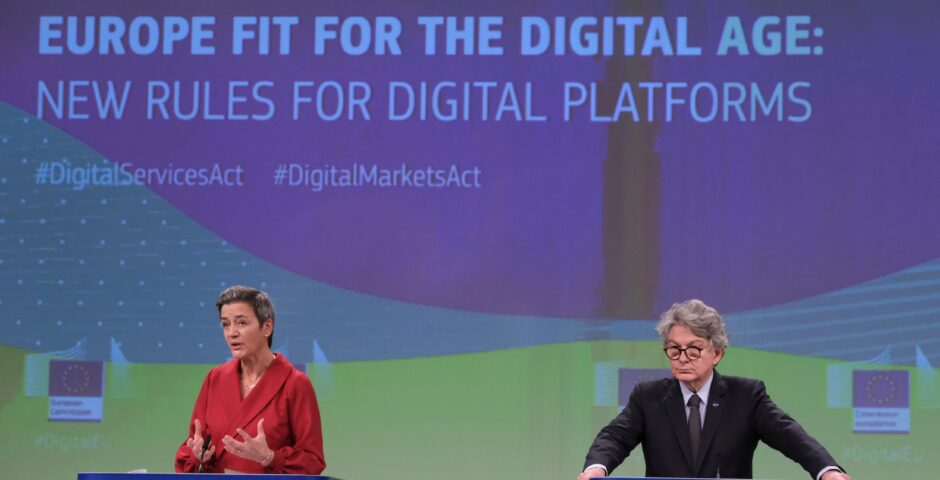EU Policy Towards a Not-So-Artificial Threat

The Proposed Regulatory Framework for Artificial Intelligence.
“I’m increasingly inclined to think that there should be some regulatory oversight, maybe at the national and international level, just to make sure that we don’t do something very foolish. I mean, with artificial intelligence, we’re summoning the demon.” – Elon Musk, 2014, MIT Aeronautics and Astronautics Department, Centennial Symposium
When I was fourteen, my father and I watched a film that I continue to think about to this day. The film was Alex Garland’s Ex Machina, released in the very same year that Elon Musk made this jarring statement above. In the film’s opening scene, the audience is introduced to the protagonist, Caleb, who receives a grand prize: a visit to the estate and laboratory of one of the greatest Artificial Intelligence (AI) developers in this fictional world. What is most haunting about this scene is the extent to which the devices around Caleb read and analyse his every action and reaction. The film shows him from the perspective of his phone, and then pans in on a closeup of a camera in his office: there is no mistaking that he is being watched extensively and constantly. This is not a novel premise in science fiction. In George Orwell’s novel 1984, the citizens of his fictional world live in houses where a television monitor is always on. Rather than simply feeding them information, it is a two-way device that records their every move, monitoring people’s days and ensuring that they abide by a specific set of rules.
There is no shortage of media focusing on the rise of AI and its potential impact on society, only nowadays, science-fiction appears to be merging with our reality. In an age where a person’s all-too-available data has become the most valuable thing about them, rare are the moments when we are not being observed. We exist in two realms: the earth and a cloud of 1s and 0s. This development has happened faster than anyone could have expected, and the risks of succumbing to this landslide have the potential to be devastating for the state of humanity. This article explores the significance of the AI act for the European market, and its place in the international plane, as well as what more the European Union (EU) should consider doing to further strengthen the policy on the future of AI development.
The AI Act and Combatting the Silicon Valley Monopoly
As of April 2021, the EU became the first actor in the world to propose a regulatory framework for AI development and usage. Interestingly, the EU has been the first to take such an initiative since it is not host to the major leading developers of the world. However, this step falls very much in line with European values – such as democracy, transparency, equality, competitive economy, to name a few. It is not the first time that the EU has placed itself at the vanguard of policymaking (for instance, with the implementation of harsh data protection regulations with the GDPR in 2016). The EU’s aforementioned values make it a very reasonable place for the birth of a new legal framework to manage the future of AI, one that could be replicated on an international scale. Moreover, since its earliest days as the European Economic Community (EEC), one of the EU’s founding values is the creation of a free single market where small- and large-scale businesses of all kinds are given equal opportunity to compete. This is increasingly challenged by the rise of AI and the American monopoly over this sector. Big Tech companies, particularly American companies such as Apple, Google, and Meta dominate this industry, causing smaller developers to suffer.
The EU AI Act has introduced measures to support smaller developers and preserve equal access to the competition in the single market, but this has not come without its challenges; the Tech Giants are tough competitors. Following the proposal of the AI Act, the EU also released the Digital Market Act (2022), which, in tandem with the former, is designed to encourage a competitive market. This has not gone unchallenged. A recent study by the think tank Corporate Observatory Europe found that Big Tech companies (most of which are based in Silicon Valley, California) now claim the spot of the largest lobbying sector within the EU, overtaking the energy sector. In an attempt to balance competition, this Act encourages more representation for smaller developers who do not have access to the resources to compete with Tech Giants. However, problems still emerge when this is put into practice. For instance, in August of this year (2023), The App Association (ACT), which is an interest group that claimed to represent smaller developers, was found to be bankrolled by Apple. This is not a one-off case. The EU must continue to enforce the measures proposed by these acts to combat the risks that emerge from a digital monopoly.
Economic competition is not the only thing that is threatened by the current monopoly on AI development. Laws and governments regulate our lives in the physical world, but who makes the rules online? A lack of regulations before the AI Act, and the fact that the Big Tech industry is private, means that these companies’ decision-makers are the de facto rulers of the digital world. This unanticipated amount of unregulated power placed on the shoulders of a few individuals is the antithesis of EU democratic values. As the European Commission expressed, AI needs to be regulated by licensed individuals, not by digital bodies. This is why a regulatory act is a much-needed first step towards creating a standard digital legal order across European society.
AI – addressing the pros and cons
Human rights and civil liberties must take priority, and they must continue to be protected. The EU has proven itself to be a leading world power when it comes to data privacy regulations, and, as AI only heightens society’s vulnerability to the dangers of misinformation, disinformation, ‘fake news’, etcetera, efforts to protect our social structure become increasingly necessary. There is a seemingly never-ending list of new dangers that AI brings to our society; from dangers of excessive facial recognition and tracking technology to the new levels of identity theft that AI makes possible, causing the line between the real and the fake to blur. Challenges to our status quo can be intimidating, but as the EU would have it, the task sounds simple: take measures to control AI before it gains too much influence over us, while also allowing for the major benefits AI can have for society. AI developments have proven to serve as a miracle worker in crucial sectors that are under-resourced and constantly developing, like medicine, healthcare, and education. There is no need to fear the future of AI development so long as it is properly managed. By leading the way in finding the right regulatory-development balance, some of the threats presented by AI can be better managed. This would allow the EU to continue to situate itself within the global order as a frontrunner for AI development policymaking.
In her State of the Union address in October 2023, the president of the European Commission, Ursula von der Leyen, stated that the EU aims to treat and regulate AI in the same way that it treated the development of nuclear weapons. It may seem like a strange comparison, but in a sense, it is a logical one. There are a lot of commonalities between nuclear development in the second half of the 20th century and AI development today. Both were scary in the sense that they put the future of humanity into question, with the potential to totally transform our experience on Earth. Diplomacy is an important tool when dealing with such a vast cross-border problem. With the creation of treaties and agreements to regulate the international proliferation and development of AI, we need to create a world where it is not something to fear because it will be something that we understand. Can the EU be a leader of this movement? If the leaders live up to their promises, it can, and in doing so, solidify its delicate position on the international plane.
The Future of AI: not a foe but a friend!
What can we expect for the future? It is risky and unsustainable for the AI development industry to continue to function in the current free-wheeling manner. An EU-centric solution to the risks presented by the rapid development of AI would be imposing adherence to a centrally mandated regulatory structure, to redistribute the balance of power and introduce transparency. Already, thanks to the AI Act, all high-risk AI developments must be registered in a public EU database. It may be interesting to consider the benefits of creating a special licence model for people seeking to develop these sorts of high-risk AI systems as well.
Regarding citizen protection, the EU should take its course of action a step further. Democratic transparency starts with education. While education and research policies are determined at the national level within EU countries, they can come together to decide on common goals to form an EU standard. It may be beneficial for EU countries to agree upon a goal to implement AI education in secondary schools much in the same way that my generation received education on the Internet. Most standardised public education systems in EU countries include classes designed to teach children skills beyond traditional academia, such as Civic Education and Information Technology. Why not propose a standard mandatory module that constructively teaches children from middle school age how to navigate the numerous possibilities that AI presents? This would encourage the EU to create a population with increased internet and technology literacy. Learning to understand AI, for experts and average citizens, will allow us to ensure it remains a tool designed to better human society. AI is not going anywhere, and we are still early in the development process, so the best course of action is the one that the EU has already set in motion, governed by common values: transparency, democracy, and humanity.
Dalia Michaud is an international student doing her Master’s in International Relations in Historical Perspective at Utrecht University. She is interested in pursuing a career in foreign policy research and diplomacy.
Image: Shutterstock




